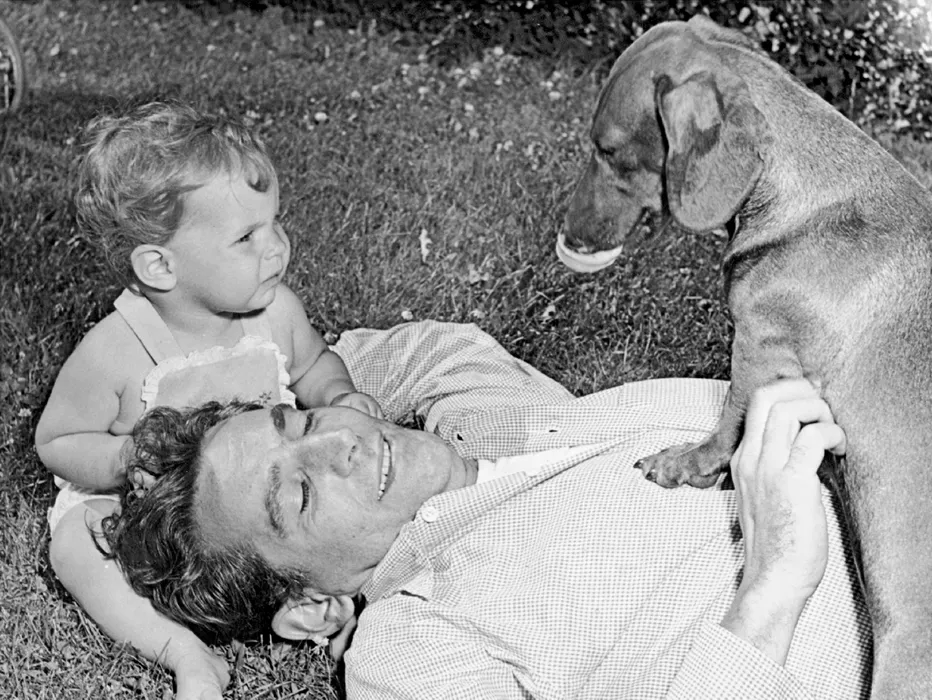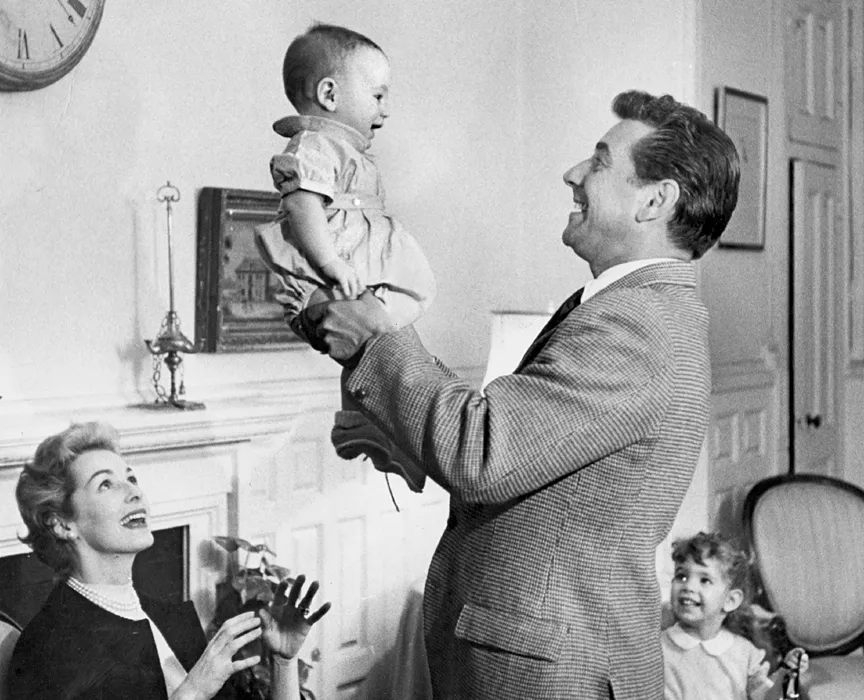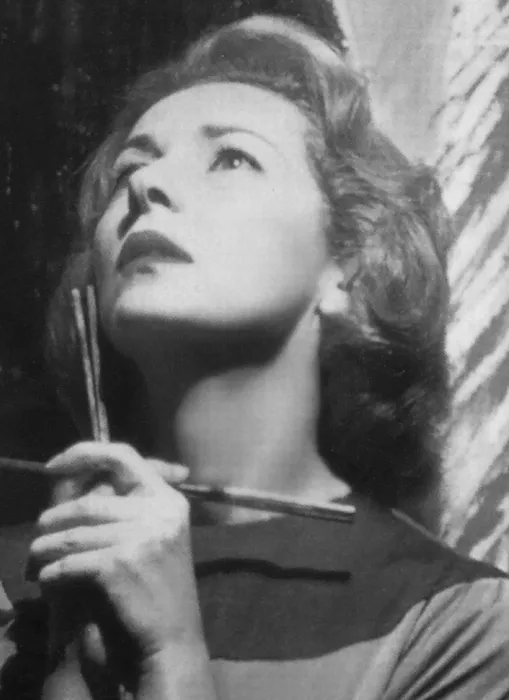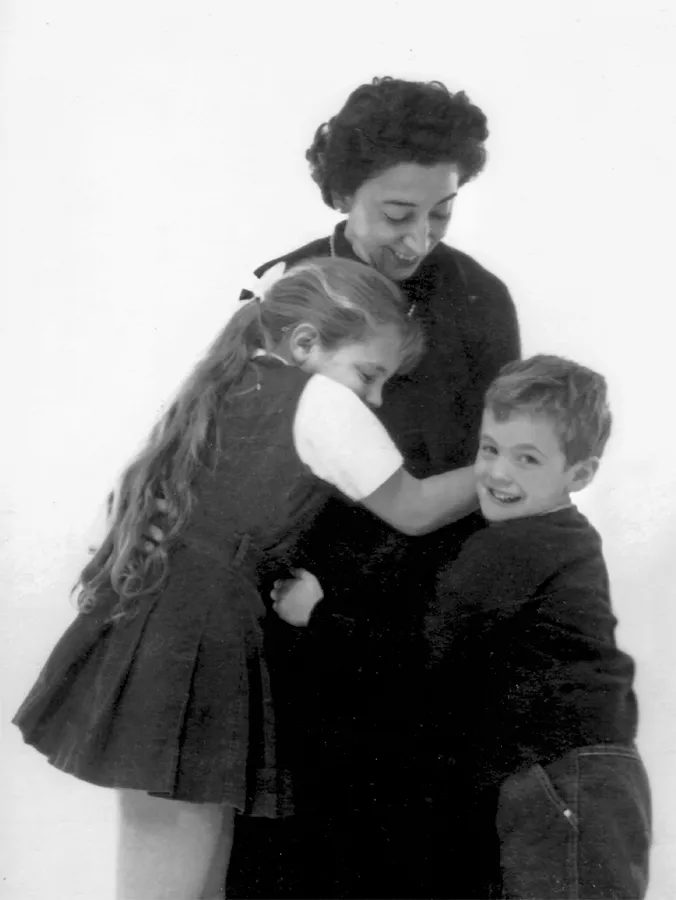1
The Osborne
LB, Jamie, and Henry the dachshund, 1953.
©Knickerbocker News, Photo by Bob Paley
The story goes that when my brother was born, Henry the dachshund and I were both so outraged by the intrusion that we jointly peed on my mother’s pillow. Nor was I consoled a year later, as I warily watched Alexander pull himself to his feet; was this little interloper going to walk now, too?
But as soon as Alexander could talk, I realized what the point of a brother was. We became coconspirators, eventually expanding into a trio with our younger sister, Nina. Together we created a force field around ourselves, a layer of insulation from the raucous, confusing world of our parents. But there was something seductive about that world, too, with its laughter and teasing; its music, theater, and books; the screaming parlor games; the elegance of smoking.
We lived in a duplex in the Osborne, a nineteenth-century apartment building on West 57th Street that had, by the 1950s, acquired a patina of sooty grandeur. Alexander and I spent little time in the downstairs spaces: the living room, with its wall of smoked mirrors and pair of nested brown pianos; the connecting library, with its clunky television console; or the studio off the front hall, where Daddy worked. We never ate dinner with the grownups in the formal dining room. Our domain was in the kitchen, where we had all our meals, and in our bedroom upstairs, with our toys and games, and our record player with the fuzzy animal decals on the sides.
In the evenings, after Rosalia, the cook, gave us dinner and our nanny, Julia, bathed us upstairs, my brother and I were brought in our bathrobes to the library, where our parents would be having before-dinner drinks with their friends. All the grownups would make a lovely fuss over us. Daddy would let Alexander open and close his Zippo lighter: shhhuppp, shhhuppp; Mummy would peel the thin red cellophane ribbon off her fresh pack of Chesterfields, expertly zip the ribbon between her thumb and fingernail, and crimp it into a little corkscrew to tuck behind my ear. Alexander would perform silly dances, while I stood on the arm of the sofa giving loud, arm-waving speeches in gibberish—imitating the man with the brushy little moustache and plastered-down hair whose occasional appearances on the library TV always wiped the smiles off the grownups’ faces. They would explain to me in oddly tense tones that he was “a very bad man.” But they enjoyed my impersonation, cheering lustily after each of my fiery cadences.
Too soon, Julia’s starched white uniform would materialize in the doorway, signaling it was time for us to go to bed. “Kisses all around, good night, good night!” our mother would trill. But we never wanted to leave. Finally, Mummy would warn us that if we didn’t cooperate, we’d have to be taken “a la fuerza,” by force. I thought the phrase meant that I’d be sent to a hellish place of punishment: “I don’t want to go to the fuerza!” I would scream, kicking Julia’s shins as she dragged me upstairs. (The next day, she’d point accusingly at her bruises: “Look what you did to me!”)
In the glow of the nightlight, Alexander and I lay in our beds, listening to the grownups carrying on downstairs. We sailed into slumber on the waves of their revelry: the tinkling of ice plopping into glasses, the roaring of songs around the piano. We knew it had to be our father at the piano, with the others clustered around him. It seemed as if all grownups ever did was have fun, with Daddy as their audible ringleader.
“Don’t drop him!” The family in the Osborne.
Our mother, Felicia, would be right beside him at the piano. Petite and elegantly beautiful, with a long, swan-like neck, she had grown up in Chile, the middle daughter of Chita, an aristocratic Costa Rican, and Roy Cohn, an American mining engineer. (No relation to the nefarious Roy Cohn of the McCarthy hearings.)
Felicia Cohn was a wild spirit; Chile was too small and provincial to contain her. In her twenties, she was allowed to move to New York to study piano with her fellow Chilean, the eminent pianist Claudio Arrau. But upon arrival, Felicia shifted to an acting career, which likely had been her plan all along. She lived in a basement apartment in Greenwich Village with her dog, Nebbish. It was 1946, Felicia was twenty-four—and that’s when she met Leonard Bernstein.
We often heard the story: There was a joint birthday celebration for Felicia and Claudio Arrau. Lenny Bernstein, the brash, handsome young musician everyone was talking about, showed up at the party. Bernstein had been in the news ever since his nationally broadcast conducting debut with the New York Philharmonic three years earlier: at age twenty-five, he’d stepped in for the flu-stricken maestro, Bruno Walter, in Carnegie Hall—an event that made the front page of the New York Times. Soon after, Bernstein made a double splash as a composer: first with his ballet Fancy Free, about three sailors on the loose in New York City, and then with On the Town, the hit Broadway show inspired by the ballet. Leonard Bernstein was young, American-born, Jewish, Harvard-educated, matinee-idol handsome, madly charismatic: a superstar. The press lavished its attentions on him, as did the women, and men, in every room he entered. This was the man Felicia met that night in 1946. As the story came down to us, Lenny sat on the couch while Felicia curled up at his feet and fed him shrimp, one by one.
They became engaged; there was even a notice about it in a gossip column. But then they broke it off. There were complications; they just couldn’t make the leap. Felicia went off to be Eva Gabor’s understudy in a Broadway play, where she fell in love with the leading man, Richard Hart. He was a hopeless alcoholic, abusive when drunk, but she loved him. She told us that Hart died in her arms, of liver failure. A couple of years later, sadder but wiser, or something, Felicia and Lenny decided to make a go of it after all. They married in September of 1951, flooded with nerves. On the drive from Massachusetts to Mexico for their honeymoon, Lenny—possibly out of pure suppressed panic—drilled Felicia on the rules of English grammar. Each morning, they would climb back into the car and Daddy would say, “You remember in yesterday’s lesson . . .” It’s a miracle the marriage even made it to Mexico.
They spent their honeymoon in a cheerful villa in Cuernavaca, spending much of their time with the writer Martha Gellhorn, who would become a lifelong friend. She may well have saved the shaky new marriage by toggling back and forth between the anxious newlyweds, lending each a sympathetic ear. I was born exactly one year later.
When I was little, my mother was a steadily working stage actress, using her mother’s maiden surname: Felicia Montealegre. She also acted in live television dramas, winning awards for her performances on shows like Playhouse 90 and Kraft Theatre. And she did concert narrations, as well. In our living room, there was a framed photograph of Mummy as Joan of Arc, her eyes looking heavenward as she is consumed by a backdrop of flames. Alexander and I loved that picture. We had no idea she was narrating Honegger’s oratorio; as far as we were concerned, our mother simply was Joan of Arc.
But there was so much more to Felicia. She was witty and well-read; she could fix lamps, paint windowsills, perform flawless manicures. She was even an expert hair cutter. We thought she looked so professional, snipping away at our father’s head, occasionally leaning back to assess her handiwork, the comb gripped between her teeth.
One area where Felicia’s expertise did not extend was in the kitchen. She could make one dish—baked eggs with béchamel sauce—but was otherwise happy to turn the proceedings over to Rosalia, her fellow Chilean. My mother had solved a uniquely personal puzzle when she decided that “the kitchen of life,” as she called household matters, would be conducted entirely in her native Spanish. My father spoke several languages and could fake his way through Spanish, but he was far from fluent. The South American staff gave my mother a comforting balance in that Bernstein-heavy universe. As for us three kids, we received the priceless, wholly unearned gift of growing up bilingual.
Felicia in the role of Joan of Arc.
Library of Congress, Prints & Photographs Division, Carl Van Vechten Collection
(The only drawback was my constant childhood language mix-ups. Not only was I sorting out two languages at once; I was also coping with my father’s vaguely Boston Brahmin accent, as well as the perfumed diction of my mother’s stage voice. So I grew up thinking we traveled to Cape Card in the summers, and that everyone prayed to Guard—which, after all, made a kind of sense.)
Julia Vega (pronounced the Spanish way: “Hoo-lia”) was our Chilean nanny. Organized, dependable, and willing to enforce the rules, Julia was utterly devoted to our mother and soon became the housekeeper, in charge of the whole domestic scene. Her English was strong enough to order the groceries over the phone, and accompany Alexander and me to Bloomingdale’s to buy shoes. Julia’s room contained the only other television in the house. When Alexander or I got sick, we were allowed to spend the whole day in Julia’s bed, drinking warm ginger ale in a fervid daze while watching the weekly feature on Million Dollar Movie over and over again.
But Julia was also irascible, and she shamelessly favored her “niñito,” my baby brother. Rosalia, the cook, by contrast, was sunny and relaxed, and her affections helped offset Julia’s wounding favoritism. The best day of the week was Friday, Julia’s day off, when Rosalia was put in charge of us. She was far less interested in rules, even going so far as to indulge us in the ultimate transgression: dinner in front of Julia’s television.
Supplemented with an ever-shifting series of South American maids, this staff of two was the engine of the safe and nurturing household Alexander and I inhabited in our early years. The staff referred to our mother as La Señora, and to our father as El Caballero: the Cavalier, literally—a rather archaic honorific. But it became somewhat more fitting in 1958, when he became the principal conductor of the New York Philharmonic, right across the street at Carnegie Hall.
As kids, we had no idea that our father’s background among striving Jewish immigrants in the Boston suburbs might be incongruous with being called a caballero. Nor did it seem odd for this Daddy of ours, who played on the floor with us and loved jokes about bodily functions, to wear tails and a long black cape to work, to tour the world for weeks at a time, and occasionally even to materialize on the screen of that clunky black-and-white television in the library. El Caballero worked hard, and was always hungry. Rosalia would prepare him special lavish breakfasts every day, featuring eggs with bacon or sausage—or sometimes, to our disgust, kippers. The combined morning smells on Daddy’s breath of orange juice, coffee, L&M cigarettes, and kippered herring made for a revoltingly heady mix.
Another characteristic Daddy smell was the blend of cigarette smoke and flatulence, which would commence at the breakfast table, once the nicotine and coffee had achieved their combined effect. “I’m getting stinky,” he would announce, and soon he was off to the bathroom with an as-yet-unread section of the newspaper, or perhaps one of his beloved, bedevilingly hard British crossword puzzles. Sometimes he would bring along symphonic scores to study. El Caballero would sit contentedly on his porcelain throne for long periods: smoking, reading, puzzling, studying, stinking. He almost always left the door open, and was not averse to being interrupted.
One morning I had to show Daddy something important and ran into his studio, where I found him sitting in his bathroom there, smoking away with a score on his lap. I begged him to look at whatever it was I was so excited about, and he replied, “Oh, I’ll be with you in a minute, darling—let me just finish this movement.” Then he exploded in laughter, which culminated in the usual coughing fit, and after pulling himself together, he explained to me why what he’d said was so funny. There simply was no moment when Leonard Bernstein wasn’t being a teacher.
Jamie and Alexander hugging Julia.
It was words, above all, that he shared with us in all their glorious incarnations. He was reciting Lewis Carroll, and telling me the difference between nouns and verbs, before I could write my name. The summer when I was six, as we gazed out on a placid lagoon, Daddy explained that if we said it looked like a mirror, we were using a figure of speech known as a simile. But if we said the lagoon was a mirror, then the figure of speech was a metaphor. For the rest of that summer, on every windless day, we’d all tell one another, “The lagoon i...




